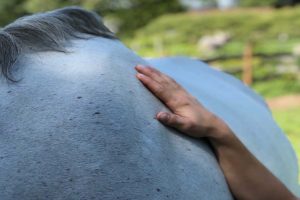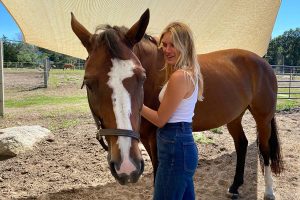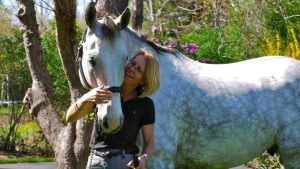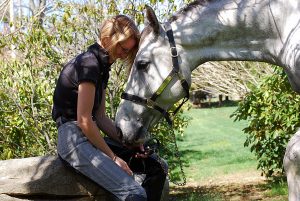Beachwood’s Commitment to Building an Inclusive Barn Culture

Beachwood Integrative Equine Therapy’s Founder and Executive Director are featured in the US Equestrian Magazine Winter 2022 edition for our work on Diversity and Cultural Inclusivity in the barn.
Lynne Bryan Phipps was interviewed about how to build a culture of inclusivity in a horse barn and how to manage conflicts when they arise. While some barns encourage competition between equestrians, which can become toxic; Lynne has built a Beachwood Integrative Equine Therapy barn culture around genuine horse-human connection, which in turn support genuine human-human connections.
How Beachwood Integrative Equine Therapy supports an Inclusive Mindset
As Lynne said about Integrative Equine Therapy and the mindset it supports: “At Beachwood, which often works with children and adults with anxiety or trauma. Reducing performance pressure is key to lowering fear… “when we learn to really listen to our horse, it’s a very different kind of listening than competing or trying to fit in… the same kind of listening also helps build a genuine connection between people…”
“Helping Humans Connect at Beachwood Integrative Equine Therapy: “Ask Lynne”
Healthy human-horse connections in a community and building an inclusive barn culture is not something that happens overnight. Lynne Bryan Phipps has been building those connections at Beachwood Integrative Equine therapy since 2017. At Beachwood we “Ask Lynne” when we need help to overcome challenges in building an inclusive barn culture. Lynne loves helping to solve these puzzles – you can “Ask Lynne” for help too!
Check out the full article from the US Equestrian Magazine here and read about all of the amazing organizations across the country who are pioneering how barns create inclusive and diverse cultures.
At Beachwood Integrative Equine Therapy, located in Rhode Island and Palm Beach, Florida, Executive Director Lynne Bryan Phipps talks to Newsmax about Beachwood’s evidence-based Integrative Equine Therapy program and their success supporting Veterans and Veteran caregivers with serious stress, trauma, and anxiety, and PTSD.
At the Beachwood Center for Wellbeing, which has locations in Rhode Island and Palm Beach, Florida, Rev. Lynne Bryan Phipps tells Newsmax that their Integrative Equine Therapy program has been successful in treating cases of serious stress, trauma, and anxiety, efficiently and effectively.
The Beachwood Center for Wellbeing, located outside of Newport, Rhode Island and more recently, Wellington, Florida, has gained a reputation for its evidence-based work dealing with stress, anxiety, depression, PTSD, and performance anxiety.
Beachwood Center for Wellbeing in Saunderstown works with clients to address underlying issues and stress-related illnesses through equine therapy. Its approach, developed by Beachwood’s founder and executive director, Lynne Bryan Phipps, is an evidence-based protocol for the equine therapist, horse and client.
A Rhode Island center with a new approach to treating stress, Beachwood Center for Wellbeing specializes in integrative equine therapy to treat a wide range of stress-related conditions from anxiety and depression to cancer and auto-immune disorders.
“I started figuring out that horses help people heal,” she said. “I’ve been a life-long equestrian, but about five years ago, with one horse in particular, [I recognized] what he was doing for me.” Phipps said that her own experiences, coupled with how she’d observed how horses benefited others, made her realize that more people needed access to horses and the therapy they bring.
Sometimes, the solutions to our deepest problems come from unlikely places. At least that’s what Lynne Bryan Phipps, founder of Beachwood Center for Wellbeing, would tell you. Her vocational journey, as both a RISD-trained designer and an ordained minister, has come together with an overarching desire to help people find healing and hope in the midst of life’s difficulties. At Beachwood, she is making this happen for those suffering from stress and stress-related illnesses with some unexpected collaborators — horses.







